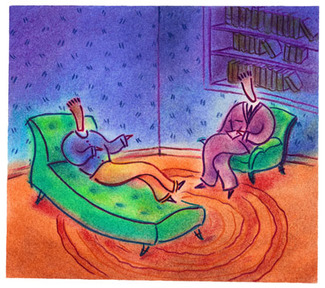In most first appointments I get asked about how the process of therapy works, how do I work, and do I think I can help them? The short and honest answer is that I have no idea. This kind of answer cannot usually be tolerated in the first appointment, so I try to explain that everyone’s therapy is different and that I will need their help to understand what the issues are, what is at stake for them, and the benefits of their learning more about how their mind works along the road of self-knowledge. Most cannot resist asking if I will give them advice and I attempt to assure them that when they discover the why’s and what’s behind their behavior, many of their answers should flow out of this clarity. This moment of kind of a wobbly presentation on my part, which comes with no clear-cut answers is an attempt to evade the appearance of being completely incompetent along with an attempt to say there might be some benefit in the process.
What most seasoned therapists cannot tell you is that they do not know anything about how they can help you. Absurd this may sound, let me explain. Trained in a variety of emotional and psychological problems, listening, hopefully, a fair amount of life experience, they can offer their concern and effort to help. What I have found is that there are two precious gifts that they can give you: (1) They can really listen to you and understand what you are saying and help you along with telling your story; and (2) Have a gift in translating that gift into a meaningful story so that you can make use of it on the way to figuring things out. Neither of these is based on anything they “know,” other than knowing how to listen and be able to put these details together in hopefully a meaningful way. Sure, they should know how to empathize with the human plight and your struggles, but this isn’t knowledge, it is their humanity.
In reference to the second gift, I cannot tell you how many times I have communicated my attempt at understanding what someone is saying, perhaps with an interpretation (which means to point to or towards something), after which my patient responds in wonder by saying something like, “How did you know that?” Honestly, I cannot take any credit for knowing anything and emphasize with them, “You just told me.” I may order the information they told me in a certain way and highlight certain things, but it was the patient who told me everything—they have the answer but are still struggling to see it. There may be talent in doing that, but some kind of guru knowledge is not it. Perhaps we can agree that it is the collaborative ability of patient and doctor to find out what the patient “knows”?









 RSS Feed
RSS Feed